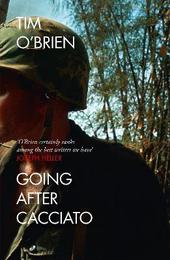
|
Going After Cacciato
Paperback / softback
Main Details
| Title |
Going After Cacciato
|
| Authors and Contributors |
By (author) Tim O'Brien
|
| Physical Properties |
| Format:Paperback / softback | | Pages:336 | | Dimensions(mm): Height 198,Width 129 |
|
| Category/Genre | Modern and contemporary fiction (post c 1945) |
|---|
| ISBN/Barcode |
9780006543077
|
| Classifications | Dewey:813.54 |
|---|
| Audience | |
|---|
|
Publishing Details |
| Publisher |
HarperCollins Publishers
|
| Imprint |
Fourth Estate Ltd
|
| Publication Date |
25 July 1991 |
| Publication Country |
United Kingdom
|
Description
Winner of the National Book Award, 'Going After Cacciato' captures the peculiar mixture of horror and hallucination that marked the Vietnam War, this strangest of wars. In a blend of reality and fantasy, this novel tells the story of a young soldier who one day lays down his rifle and sets off on a quixotic journey from the jungles of Indochina to the streets of Paris. In its memorable evocation of men both fleeing from and meeting the demands of battle, 'Going After Cacciato' stands as much more than just a great war novel. Ultimately it's about the forces of fear and heroism that do battle in the hearts of us all.
Author Biography
Tim O'Brien was born in Minnesota and served as a foot soldier in Vietnam from 1969 to 1970, and after graduate studies at Harvard worked as a reporter for the Washington Post. When 'If I Die in a Combat Zone' was published in 1973, it established him as one of the leading American writers of his generation, a status that was confirmed when 'Going After Cacciato' won the National Book Award for fiction.
Reviews'To call "Going After Cacciato" a novel about war is like calling Moby-Dick a novel about whales. O'Brien's writing is crisp, authentic and grimly ironic ... a major achievement' New York Times Book Review 'Not only the best novel about the Vietnam War, but among the finest works of fiction in contemporary American literature' Philip Caputo, Esquire 'His irony recalls that of Stendhal, his landscapes have the breadth and scope of Tolstoy's, and the essential American innocence of his vision deserves to stand beside that of Stephen Crane' National Book Award citation
|